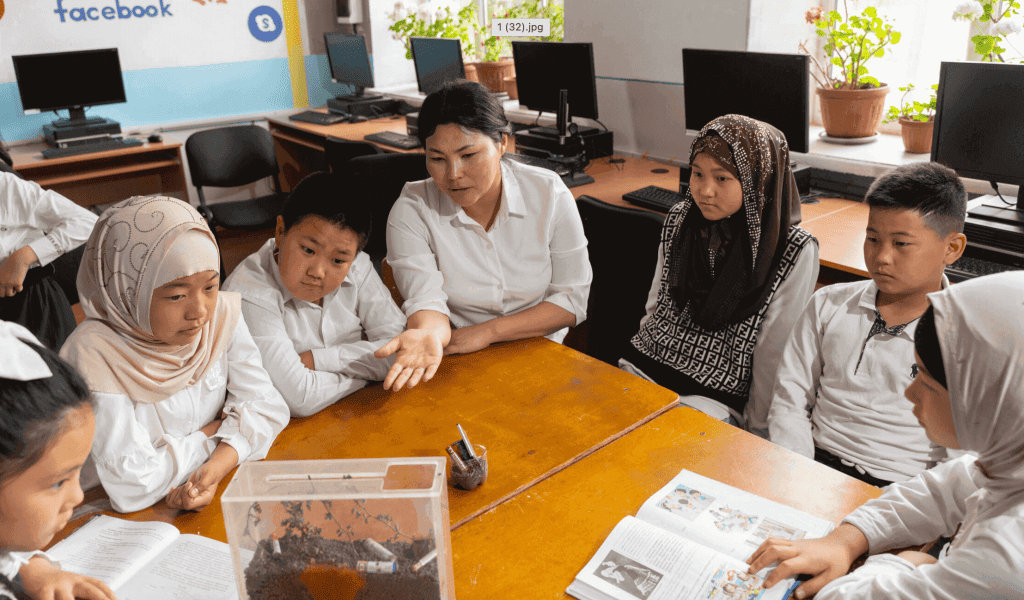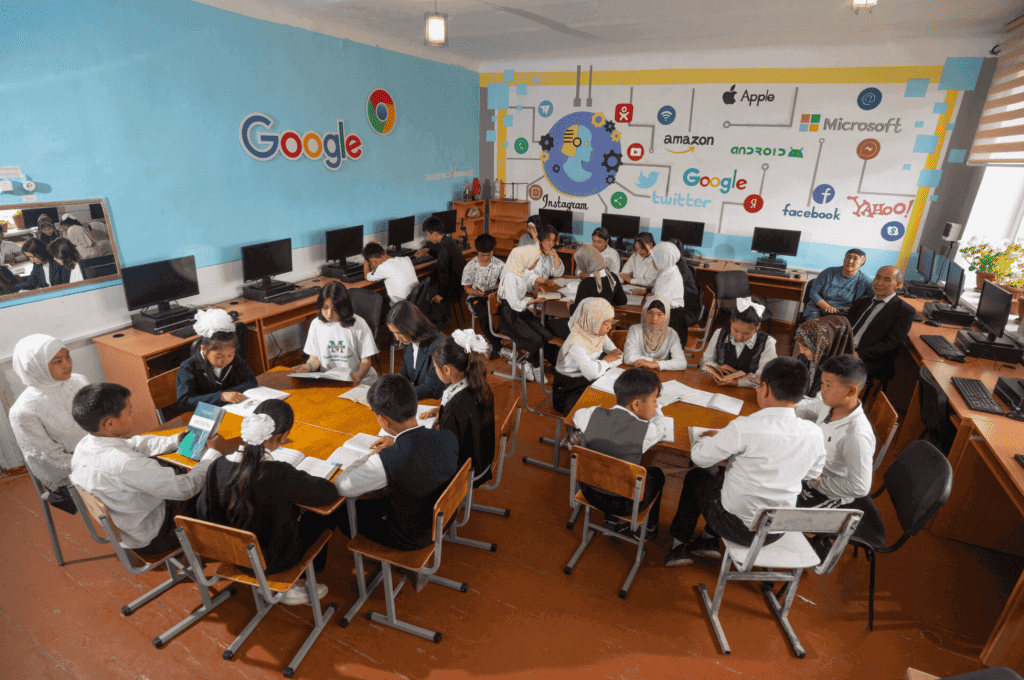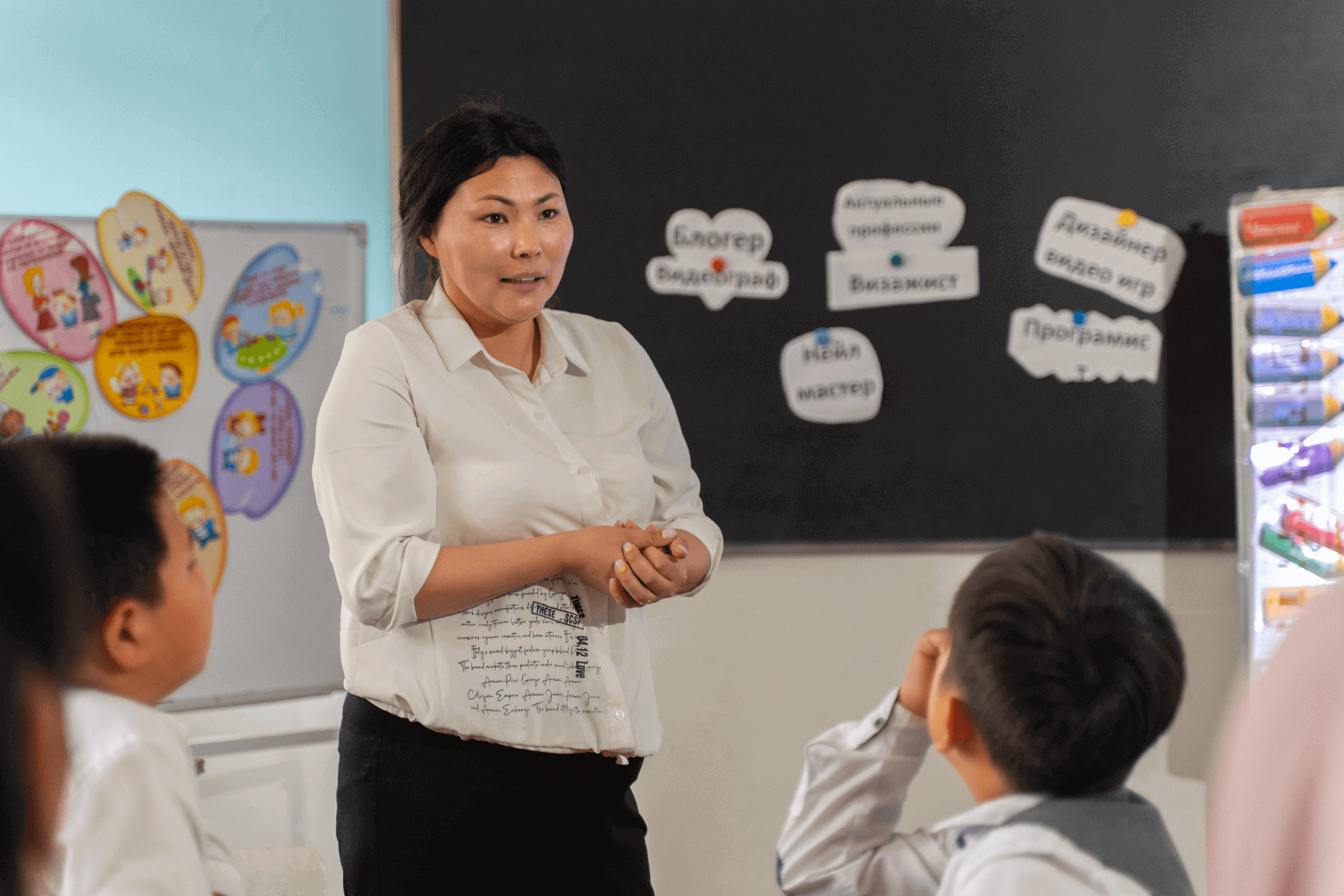Aikanysh Zotova, an inspiring educator from the Chui Oblast of the Kyrgyz Republic, has emerged as a leader of change in her school thanks to an innovative project aimed at fostering student engagement, made possible through her involvement with the Schools2030 programme.
Based in Shivaza General Secondary School in Alexandrovka village, Aikanysh’s has been working to transform their academic experiences of her students, and in so doing has also inspired teachers and students from other schools. Her innovation – “Curiosity Minds” – is the result of a year-long, human-centred-design (HCD) aimed at improving holistic learning outcomes for students, and the initial impact has been very promising.
Context: Identifying the problems
Through the explore phase of the HCD process, Aikanysh and her colleagues identified that students were often not energised in their work, and even when they were, they struggled to extract, analyze, and form their own opinions from various information sources. Additionally, students often preferred to work in groups with homogenous backgrounds, yet the village of Aleksandrovka is multiethnic and experiences significant internal migration. The design team also noticed that parental support was rarely present in student activities, which is widely known to hinder positive academic outcomes.
The Solution: project-based work to promote self-efficacy, curiosity and collaboration
“Curiosity Minds” strategically organised students with different backgrounds and ages into project groups. After creating or selecting their own research questions, the students collaborated to find the answers. Topics included: measuring the sustainability of battery disposal, comparing the health risks of different headphones, evaluating gas and coal heating system economics, and more! Aikanysh recounted that community members also became interested in the projects as many related to their daily lives. Once completed, students showcased the results of their research.

“Learning became so much fun!”
Put simply, the impact of Aikanysh’s idea has been resoundingly positive. Her students have shown remarkable progress in their academic performance, demonstrating a newfound curiosity and enthusiasm for learning. Akbermet, a student of grade 9, reflected:
“I had the coolest project ever this year! We learned by asking questions and trying things out. It helped me understand things better and think more carefully. The best part was doing different experiments and finding answers on my own. Learning became so much fun! We worked on our projects in groups and learned how to be a team and listen to different ideas. We got better at working together and making friends. I’m happy that the project was made just for us and what we like to do.”
By allowing students to pursue their own interests in societally-relevant contexts, Aikanysh’s innovation successfully instills a sense of ownership and agency. This enthusiasm has translated into improved reading comprehension, knowledge retention, and self-confidence across all grade levels. As Aikanysh recounts, “educational activities are significantly more effective when the students and parents themselves are energised by the work.” By taking a student-centric and differentiated approach, Aikanysh and her colleagues have ensured that students feel motivated and challenged while collaborating in diverse groups to learn reading comprehension and critical thinking skills.

One of the remarkable achievements of “Curiosity Minds” is its successful involvement of low-achieving students. By creating a student-driven, nurturing learning environment, Aikanysh has empowered these students to actively participate and contribute to their group’s project. This approach has not only boosted their self-confidence but has also led to visible improvements in their academic performance in reading comprehension among other skills.
Bringing the community together
Moreover, Aikanysh’s innovation has drastically improved ethnic inclusivity. The village of Aleksandrovka is home to a diverse population – comprising Kyrgyz, Russian, Dungan, Uzbek, Kurdish, and Uighur inhabitants – and “Curiosity Minds” offers a place where all of these groups (both students and families) can collaborate. By uniting people of different backgrounds around common project themes, Aikanysh’s innovation has improved the language, communication, and cultural-integration challenges that minority ethnic students often face. As a result, “Curiosity Minds” has nurtured a pluralistic learning environment that cultivates a sense of value, respect, and inclusion for all students.
Aikanysh envisions a school where students are actively involved in meaningful, real-world learning experiences that can align with the national curriculum too.
The innovation’s emphasis on cross-grade collaboration has also been instrumental in creating a dynamic and enriching learning experience. By bringing together students from different grade levels (4th graders working with 9th graders, for example), the idea has facilitated mentorship, peer learning, and the exchange of ideas – concepts that have otherwise been absent in Aikanysh’s students’ past.
Yet, the transformative impact of Aikanysh’s innovation extends beyond the classroom. “Curiosity Minds” has fostered a stronger connection between the home and school by encouraging students to seek their parents’ perspectives in the project research. This has resulted in increased parental support, encouragement, and involvement in their children’s education, ultimately yielding a more holistic and comprehensive learning experience.
Looking towards the future
Aikanysh envisions that such practices can be seamlessly integrated into the existing curriculum, eliminating the need for additional programmes and unpaid work for teachers. Aikanysh believes that existing after-school programmes can be leveraged to support the implementation of similar projects. Regardless of when it takes place, incorporating project-based learning as part of regular homework assignments allows students to have the opportunity to explore real-life topics and develop essential skills in alignment with their interests. This transformation in teaching and learning approaches has the potential to create a more engaging and relevant educational experience for all students.

Ultimately, Aikanysh Zotova’s innovative and passionate approach to teaching and her students, supported by the Schools2030 programme, has set a remarkable example for educators worldwide of how a process of co-creation and innovation can transform students’ learning outcomes. Through her idea, she has not only improved the educational experiences of her students but has also redefined the role of parents and communities in fostering learning communities. Aikanysh’s unwavering dedication to student engagement and “Curiosity Minds” has inspired a brighter future of education in the town of Alexandrovka, and she has felt extremely fortunate to have recently shared these outcomes at the Schools2030 Global Forum in Porto.
Watch Aikanysh present the “Curosity minds” innovation at the Schools2030 Global Forum 2023
